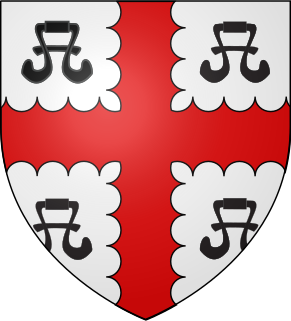Related Research Articles

Adam de Brome was an almoner to King Edward II and founder of Oriel College in Oxford, England. De Brome was probably the son of Thomas de Brome, taking his name from Brome near Eye in Suffolk; an inquisition held after the death of Edmund, 2nd Earl of Cornwall, in 1300, noted de Brome holding an inheritance of half a knight's fee.
Sir John de Benstede KB (c.1275 –1323/4) was a prominent member of the English royal household in the late 13th and early 14th century. He was Prebendary of Sandiacre from 3 February 1297 until, presumably, 1308, when he married. He was also King's Secretary, and he served variously as keeper of the Great Seal and controller of the wardrobe. He also served as Chancellor of the Exchequer from 1305 to 1306, and as a royal judge from 1309 onwards.

Sir William de Shareshull KB (1289/1290–1370) was an English lawyer and Chief Justice of the King's Bench from 26 October 1350 to 5 July 1361. He achieved prominence under the administration of Edward III of England.
Sir Thomas Billing was an English judge and Chief Justice of the King's Bench.

Sir Henry Redford or Retford was a Knight of the Shire, Sheriff of Lincolnshire and the Speaker of the House of Commons.
Richard de Abyndon, Abendon, or Abingdon was an English judge.

Sir John de Ashton or Sir John Assheton, was an MP and soldier under King Henry IV and King Henry V.

John de Bourchier was an English Judge of the Common Pleas and the earliest ancestor, about whose life substantial details are known, of the noble and prolific Bourchier family, which in its various branches later held the titles Barons Bourchier, Counts of Eu, Viscounts Bourchier, Earls of Essex, Barons Berners, Barons FitzWarin and Earls of Bath.
Robert de Cliderhou, was a Chancery clerk and pastor who was allegedly involved in the rebellion against Edward II by Thomas, Earl of Lancaster.
John de Bankwell, Bakwell, Bacqwell, or Banquelle was an English judge.
Richard de Beresford or Bereford was an English-born cleric who held high political office in Ireland in the early fourteenth century as Lord High Treasurer of Ireland and Lord Chancellor of Ireland.
Robert Baynard, was an English politician and judge.
Sir William Shelley (1480?–1549) was an English judge.
Roger de Beaufeu or Bello Fago, judge, was probably of the same family as Nicholas de Beaufo of Beaufo's Manor, Norfolk, a contemporary of the judge.

William de Vesci or Vescy was a prominent 13th-century noble. He was a son of William de Vesci and his second wife Lady Agnes de Ferrers, daughter of William de Ferrers, 5th Earl of Derby, and his first wife Sibyl Marshal.
William de Skipwith was a fourteenth-century English judge, who also served as a judge in Ireland. He held the office of Chief Baron of the Exchequer 1362-5. He suffered temporary disgrace when he was removed from office for corruption, but he was restored to favour, became Lord Chief Justice of Ireland 1370-2, and later returned to the English bench. He appears to have been the only High Court judge to have escaped impeachment by the English Parliament of 1388.

Simon de Montagu, 1st Baron Montagu was summoned to Parliament by writ and thereby became the 1st Baron Montagu. He was the ancestor of the great Montagu family, Earls of Salisbury.

William de Ormesby was a 13th-14th century English judge. He was the Justice of Scotland between 1296 and 1297 after the invasion of Scotland by England in 1296.

Sir William Howard of East Winch and Wiggenhall in Norfolk, England, was a lawyer who became a Justice of the Court of Common Pleas. He is the founder and earliest known male-line ancestor of the House of Howard, as is firmly established by historical research.
References
- . Dictionary of National Biography . London: Smith, Elder & Co. 1885–1900.
- Attribution
![]() This article incorporates text from a publication now in the public domain : "Batesford, John de". Dictionary of National Biography . London: Smith, Elder & Co. 1885–1900.
This article incorporates text from a publication now in the public domain : "Batesford, John de". Dictionary of National Biography . London: Smith, Elder & Co. 1885–1900.